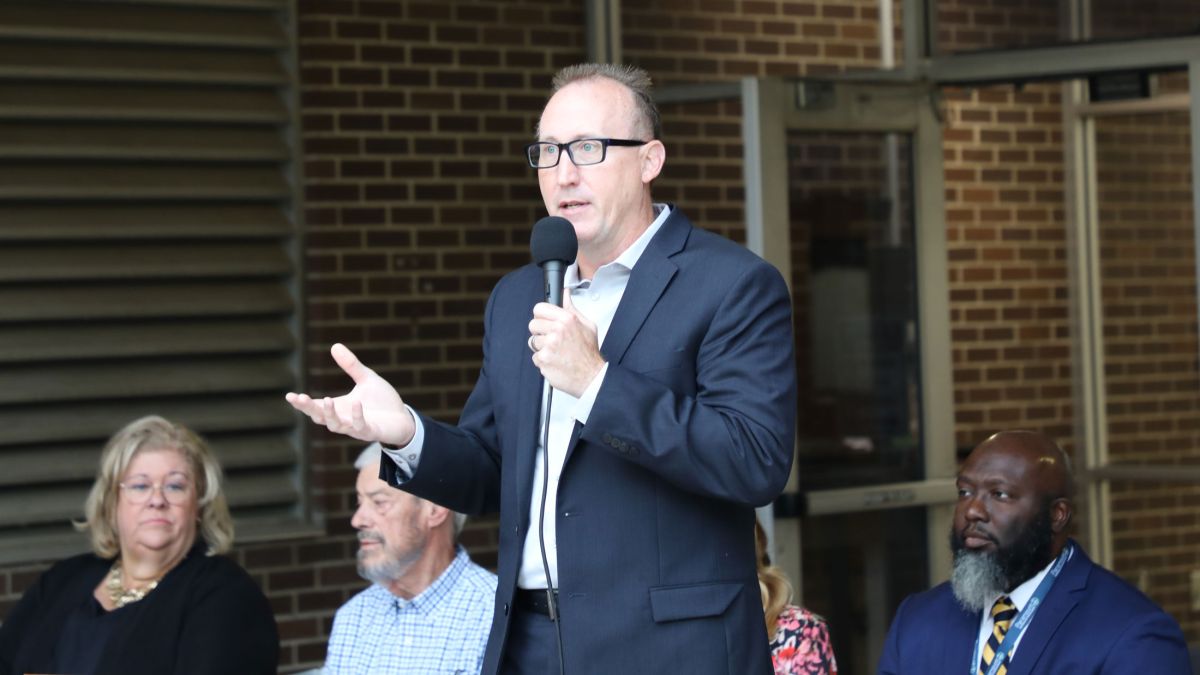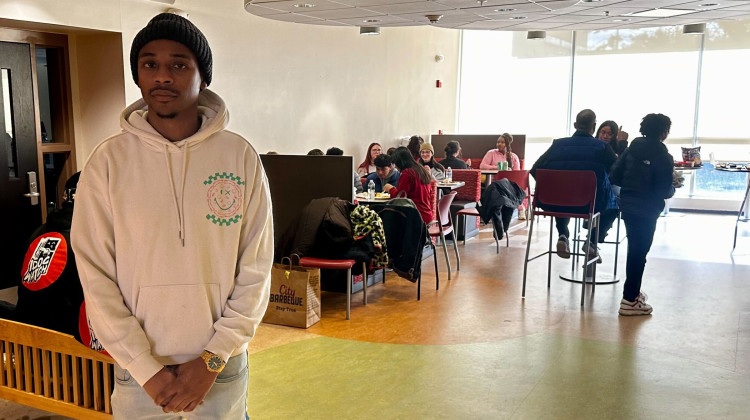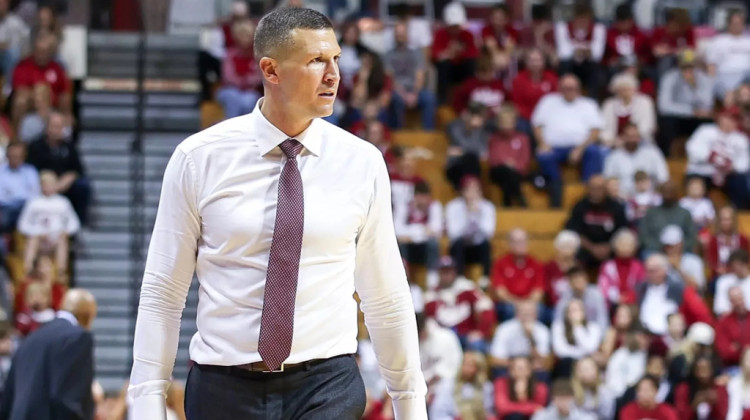
For every 100 students in general education at Paramount, there were about 45 suspensions, according to a WFYI analysis of state data from 2024-25. The statewide average was 10.
iStockThirteen-year-old Levent goes to an Indianapolis middle school that’s been celebrated for its test scores. But his mother, Shania, says he’s falling behind because the school has suspended him repeatedly.
Levent has ADHD, or attention-deficit/hyperactivity disorder, which his school has documented as a disability. Shania believes it drives much of the behavior that he has been disciplined for — including safety concerns like leaving campus and misbehavior like repeatedly disrespecting teachers.
“Why is he getting in trouble for what ADHD looks like?” Shania said.
Levent is a student at Paramount Englewood middle school, part of a growing charter network. Among children of color and those from low-income families, students at Paramount often outperform their peers on state tests. On the strength of those results, supporters have urged Indianapolis Public Schools to partner with the network.
But the approach comes at a cost for some students: a WFYI analysis of 2024-2025 state data shows that Paramount schools suspended students with disabilities about three times more often than the state average.
Database: Look up your school's suspension rate
Many Paramount parents love the schools for their calm environment and focus on academics. But several parents told WFYI that some students – especially those with disabilities – struggle to follow the rules that foster quiet classrooms.
“It’s either you fit this mold or you don't,” Shania said. “And if you don't, then we're going to suspend, suspend, suspend.”
In records, school staff have said they don’t believe all of Levent’s misbehavior is related to his disability.
WFYI is using parents’ and students’ middle names because this story describes how students have been disciplined at school, and it describes their disabilities.
Paramount’s CEO Tommy Reddicks attributed the high suspension rates at Paramount schools in part to its structured approach, which he believes protects the learning environment and ultimately benefits students, including those with disabilities.
Reddicks said Paramount schools work to reduce suspensions among students with disabilities but that they’re sometimes necessary.
“You know, a lot of our special education incidents typically involve safety of others or safety of the students in question,” he said.

While some Paramount students are never suspended, others — like Levent — are suspended again and again. Records show that Levent has been suspended for fighting, for “not following school rules” when he was already in trouble and for “horseplaying (fighting) in the restroom.”
It often feels to Levent, who is in eighth grade, like he’s being unfairly punished. Take an incident last year when he was suspended for wrestling with a classmate.
“It felt like I was getting suspended for just playing around with my friend,” Levent said.
‘Calm’ hallways and academic success
When Reddicks describes Paramount schools, one of the first words he uses is calm. The halls are quiet. In classrooms, students are focused on school work.
“We’re very much a calm, collected school environment rather than a kind of really jazz you up cheerleading type of environment,” Reddicks told WFYI in an interview.
For some Paramount parents, the discipline policies that create quiet classrooms are a selling point. Nicol, who has sent five children to Paramount’s Brookside campus, kept driving them there even after moving across town.
“I like that they’re strict,” she said. “You walk into Paramount, their kids are sitting at the desk. Their kids are doing what needs to be done.”
Her 12-year-old son, Leon, has autism and other disabilities. After his grandfather died last year, his behavior spiraled — he began cussing and throwing objects in class. Nicol believes not every suspension was necessary, but she agrees he should be suspended when he pushes or fights with other students.
“He does need to be held accountable,” she said.
Overall, Nicol says educators at Paramount have worked hard to meet Leon’s needs. She trusts Paramount because she believes her two oldest children’s experience there set them up to succeed in high school.
Structured approach contributes to high suspension rates
As a charter school, Paramount is privately managed but publicly funded and free to attend. The network has eight schools in Indiana which serve students in kindergarten through 8th grade.
Paramount has unusually high suspension rates across the board, including among students without disabilities. For every 100 students in general education at Paramount, there were about 45 suspensions, according to a WFYI analysis of state data from 2024-25. The statewide average was 10.
For every 100 children receiving special education services, there were about 73 suspensions. The statewide average was 22.
Those numbers reflect total suspension incidents, including among students who are suspended multiple times.
That high rate, however, is actually a significant decline in the number of suspensions among students with disabilities compared to the prior school year.
Reddicks said the decline reflects both the maturing of campuses opened in recent years, which enrolled first-time Paramount students, and the network’s focus on training staff to reduce suspensions.
But Reddicks acknowledged that the Paramount model can lead to high suspension rates.
“We are a school of choice, so parents who desire a more structured, rigorous education can decide that our model is for them,” he wrote in an email to WFYI.
“We know that, in our more structured system, students with suspensions still perform very well and typically outperform state averages (performing significantly higher than students without suspensions in nearby schools),” Reddicks wrote.
Should Paramount replicate?
Charter school advocates have long seen Paramount as a model of an academically successful school system that should be emulated and expanded. But some education leaders and critics of charter schools have raised concerns about how often students are suspended.
The high suspension rates are “alarming” and a clear indication that while Paramount schools are “helping some, they're hurting others,” said Pastor David Greene of Purpose of Life Ministries in Indianapolis.
Greene sits on the Indiana State Charter School Board, which authorized a Paramount campus in Lafayette. He was not on the board at the time the school was approved.
Paramount’s approach cannot simply be emulated in IPS because the district must educate a far broader group of students, he said.
“You are going to have some discipline issues,” Greene said. “That should not lead to a bunch of suspensions … where you're really trying to tell somebody you ain't gonna be welcome.”

When IPS announced a district-wide restructuring in 2022, the Mind Trust, an influential Indianapolis nonprofit, and the parent-advocacy group Stand for Children Indiana publicly criticized the plans for not including any partnerships with Paramount. Both groups support charter schools.
At the time, Superintendent Aleesia Johnson told Chalkbeat that the network’s suspension rates were higher than those in some other schools the district aimed to replicate.
In a statement to WFYI, CEO of the Mind Trust Brandon Brown said Paramount’s Indianapolis schools have better academic results than the district. Brown pointed to state test data that shows on average, about 12% of students in special education passed both the state math and English tests at three of Paramount’s campuses in Indianapolis — Brookside, Cottage Home and Englewood. That’s compared to 4% in IPS.
(Paramount began working with Andrew J. Brown Academy last year. The school became the network’s latest Indianapolis campus in July. ILEARN results for students in special education at Paramount’s Girls in STEM Academy were suppressed by the state because there were fewer than 10 students.)
“There are more Black students at Paramount’s Indianapolis schools who scored proficient on both sections of the ILEARN than all IPS operated schools combined,” Brown said. “We fully stand behind Paramount and the life-changing outcomes they help their students achieve.”
Justin Ohlemiller, executive director of Stand for Children Indiana, said in a statement that the parents his organization works with see two things that are true at the same time about Paramount's approach to academics and discipline.
“They’re helping historically underserved students achieve at a pace well above local and state averages, and they also need to continue to refine their discipline practices – which is true of several other public schools.”
The costs of missing school
Nationally, many educators say student behavior has worsened since the pandemic. In Indiana, schools suspended more students in the years after the pandemic than at any point in the prior decade.
Experts warn that suspensions often punish behavior caused by students’ disabilities without teaching them the skills to change.
“I would say suspension doesn't fix much,” said Federico Waitoller, a professor of special education at the University of Illinois Chicago. “You're not teaching anything, right? You're saying, ‘Don't do this.’ But you're not telling the student what to do, how to do it — and give them the supports to do it.”
Levent likes football, rap music and Fortnite. His mother Shania said she’s seen some of his difficult behavior at home, and she would like him to learn to control his impulses — to stop horseplaying and constantly arguing when adults ask him to do something.
But Shania said suspensions do little to teach her son how to behave. And the missed days of school add up. Records show Levent’s school suspended him for at least 10 days last school year. Then, after Levent walked off campus a few weeks from the end of the year, he had to spend most of the final days of the year at home, where he received about an hour of remote instruction a day, according to school records.
She worries each absence pushes him further behind.
“I don’t want him to get even further behind,” she said. “Because again, this is a kid that’s behind.”
Levent started his final year of middle school last month – and already Shania is frustrated by how the school is handling his behavior. She's considering pulling him out.
Contact WFYI Education Reporter Dylan Peers McCoy at dmccoy@wfyi.org.
Correction: This story has been updated to correct the number of Indianapolis campuses managed by Paramount.
 DONATE
DONATE







 Support WFYI. We can't do it without you.
Support WFYI. We can't do it without you.